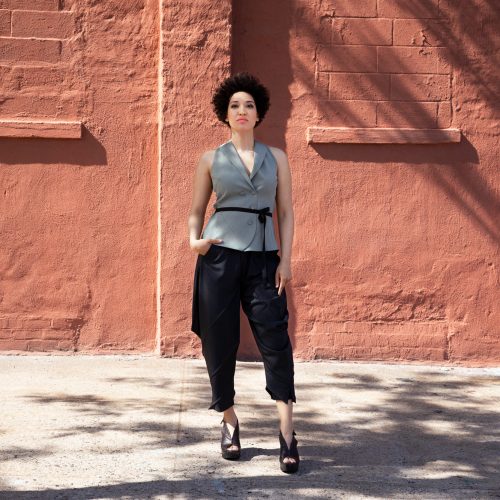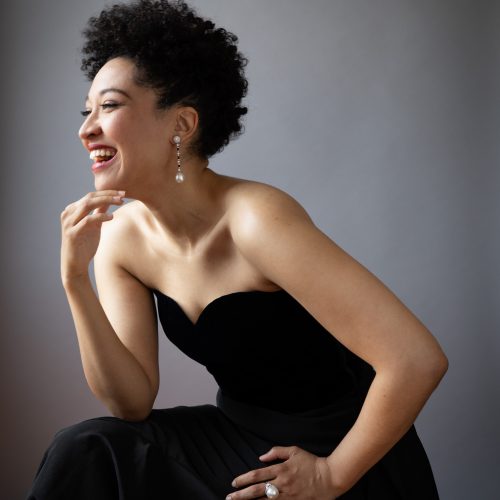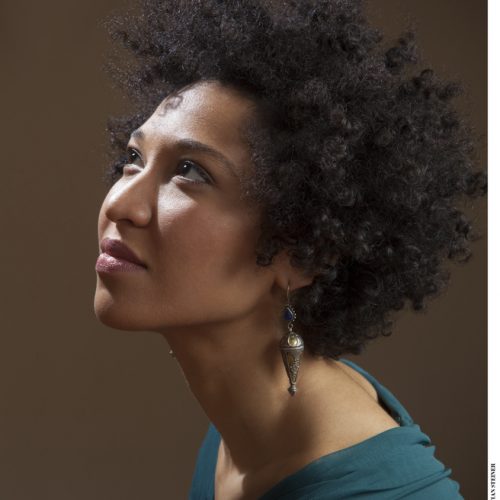All of this contains the making of a brilliant artist. But what separates, and elevates, Bullock is how her personality comes across. As her recital unfolded on Monday, you could trace her thinking about music, politics, history and herself. At no point, however, did the evening slide into the polemical, in part because of her sincerity.
The star of the show was, of course, Bullock, who created an intense, powerful, and insightful reading that was not, and never was supposed to have been, Josephine Baker. She was Julia Bullock! However, by identifying with Baker’s situation and immersing herself in the emotional torment she undoubtedly suffered, Bullock was able to produce a believable, nuanced portrait of what it means for an individual to spend their life on the wrong end of other people’s prejudices, of being forced to accommodate these prejudices in order to make a success for themselves, of having to suppress the anger and rage and retain a smiling face.

Commentary: How Julia Bullock became an essential soprano for our times
“On the first 20 seconds of her first solo recording, “Walking in the Dark,” Julia Bullock sings: “When out of men’s hearts, hate is hurled / Maybe, baby, you’ll live in a better world.” She is unaccompanied. There isn’t a lot of emotion in the quietude of those 16 words uttered in arresting song; just enough to make you realize that the emotion has to come first from you, not her. Passive listening isn’t an option. You need to prepare. Bullock can, and she will, lay it on soon enough.”

NPR’s 10 Best Classical Albums of 2022
Soprano Julia Bullock‘s affecting solo debut, with its breathtaking spin on a deep cut by the enigmatic Connie Converse and a sublime rendition of Samuel Barber‘s Knoxville: Summer of 1915, traces the tenuous connections individuals share with one another and their own senses of purpose on earth.

Authentic Human Utterances
“Singing has become the practice through which I exercise my desire to be conscious and intentional. I think I will always want to express with my body. I don’t know if that desire will ever go away. That seems to be a very human desire, if it’s not shut down.”

Star soprano Julia Bullock: ‘Music helps you channel emotions in super direct ways’
The singer is a thrilling talent in the classical and opera world — she discusses her long-awaited debut album
“We can and will keep going. We can and will refine and reform how we work together, live together, and move towards more restorative efforts. I just hope that as we continue to experience movement during times of restriction, we will take it as an invitation to increase our awareness, sensitivity and consciousness, so that we will not only survive the next cycle, but celebrate more revolutions with and around each other.”

Jennifer Melick, Opera News
A Very Different Vibe
“Bullock’s career is not a conventional one—not by a long shot. She resists categories; she could be considered a soprano but goes by “classical singer” … Her expectation as she goes back to live performances is “to approach every single step of it with such care now,” she says, “and without coming across as too demanding of presenters, just that I can do my job, ensuring whatever the vision I have for something, as opposed to just a lovely experience…. I’m looking to be activated and enriched, not checked out. For me, it’s not an escapist experience.” Overall, she would like to see “a little more trust in the artists who are conceiving comprehensively of the experience.”
Whether paying glowing tribute to Nina Simone or fusing the program’s disparate musical selections into a gratifying whole, Bullock delivers. … Bullock sings with a moving, mounting urgency set deep in the timbre of her lustrous voice and dramatic phrasing. Pay attention to the world as we find it, to its sorrows and joys, Lineage reminds us, especially after this long year of a world put in peril. Like musicians attending to each other across the centuries, we’re all connected.

Clive Paget, Musical America
Artist of the Year: Julia Bullock: Agent of Change
“Smart, savvy, and with her velvety soprano shot through with steel, Julia Bullock is one of the most dramatically electrifying and vocally arresting singers on today’s operatic stages.”

Arya Roshanian, Bomb Magazine
Contextualizing the Repertoire
“As one of the foremost classical singers of the current generation, Julia Bullock’s relationship to music begins with its context. Though the classical music industry may be notorious for overlooking its systemic problems, Bullock instead questions her surroundings with sharp intellect and reason—and does so bluntly.”

Tom Huizenga, NPR
Julia Bullock: Tiny Desk (Home) Concert
One of today’s smartest, most arresting vocalists in any genre…Bullock, who also considers herself an activist, has shaken up the classical music world recently with provocative programming and expressive performances…It’s among the most transcendent musical moments I’ve experienced this year.

The New York Times
Best Classical Music of 2020
One of the few opera stars who retains her voice’s seductive potency as she scales down for small rooms, this American soprano was in Germany with her husband, the conductor Christian Reif, for the first part of lockdown. He joined her on piano in a memorable series of songs they posted on social media. None was more moving than a dreamy, quietly commanding version of Gerry Goffin and Carole King’s Brill Building classic “Up on the Roof,” rising to rapture. Like Mx. Bond’s “Calling Occupants,” it was a love letter to New York as the crisis was at its most intense.

Nastia Voynovskaya, KQED
Julia Bullock’s Empathy is Her Superpower in the Classical Music World
Bullock’s superpower lies in reaching across centuries and continents, and feeling into the love, yearning and loss at the core of the human experience.

Justin Davidson, Departures
An Homage to the Creatives, Entrepreneurs, and Change-Makers of Today’s America
Even before the pandemic threw live performance into suspended animation, the soprano Julia Bullock was prodding the opera and concert world to take a good hard look at its future. With her high-gloss technique, sinewy voice, and the kind of stage presence that can make a spotlight seem wan by comparison, she could have floated through a traditional operatic career, singing, sobbing, and dying onstage several times a week.

Neil Fisher, The Times
Julia Bullock: ‘I wasn’t able to speak for hours at a time’: The soprano on overcoming serious trauma — and singing an English masterpiece
One of the most exciting singers of her generation, blazing a trail not just as a soloist, but a programmer and activist, the 34-year-old American soprano is — hurrah — based in Munich, where she lives with her German conductor husband.
The last live performances she gave pre-pandemic were of Britten’s song cycle Les Illuminations, performed with the conductor Esa-Pekka Salonen. Neatly, her return to the UK is for the same piece with the same conductor (but now with the Philharmonia orchestra) in a streamed performance from the Southbank Centre, followed by two concerts, with crowds, at Snape in Suffolk.
Her vibrant, dark-hued lyric soprano is gratifying to hear in and of itself, but it is also a deeply human sound, its vibrato seemingly quickened by the heart itself.

Zachary Woolfe, The New York Times
‘This Is Who We’ve Been Waiting For’: A Diva on the Precipice
The soprano Julia Bullock is on the verge of an unconventional career. The 33-year-old soprano had woken up the morning of her performance here with a scratchy throat. O.K., she thought, it happens. But over the course of that recent Tuesday, her fever rose; the chills began.
It is rare to find a classical singer who can truly project an aura onstage… [Julia Bullock] is a musician who delights in making her own rules—and when, in time, she learns how to break them, her artistry will be complete.
Note for note, the singing was sensational. Bullock’s voice is deeply rich and richly deep, with both the qualities of Anderson’s expressive contralto and Price’s electrifying climaxes. Meaning was, word for word, expressed through not only her exacting vocal inflection and her precise facial expression, but even the slightest movement of her hands. Her eyes made contact. Communication was on every level direct. Beyond this was a sense of artistic identity, Bullock’s awareness, as a singer and woman of color, of the music world she comes from and the one she lives in.

Keziah Weir, Vanity Fair
History Is in the Making at the Metropolitan Museum of Art
Julia Bullock, one of opera’s fastest-rising stars, is using her artistic platform for social activism to glorious effect … She’s young, highly successful, politically engaged—but not least is her ability to inject each note she sings with a sense of grace and urgency, lending her performances the feel of being both of the moment and incredibly timeless.
The soprano Julia Bullock […] touched everything she sang with radiant, even holy, sobriety.
Bullock’s voice and vision are forces to be reckoned with.
The soprano Julia Bullock made me tear up at her recital on Sunday afternoon. It wasn’t until the next day that I realized that when I last heard her a couple of years ago, I said exactly the same thing.

WQXR Staff, WQXR
WQXR Presents “19 for 19”: Artists to Watch in the Upcoming Year
Speaking of changing the world, every so often an artist comes along who, quite simply, has it all. Julia Bullock is one of them. This radiant soprano boasts an unforgettable stage presence and a voice from heaven — we get shivers just thinking about it. But perhaps more than anything, it’s how Bullock puts that oh-so-resonant voice to use that most impress us. A deep thinker and probing intellect, she considers her role as a socially-conscious activist as important as any note she sings.
Bullock is the real deal. A charismatic stage presence, she has a magnificent instrument that projects evenly and betrays no problem spots: the low register is dark and honeyed, the middle one warm and rounded; the top gleams. Her intonation is spot-on, her diction crystalline. And her interpretive arsenal includes a powerful range of shadings, from dusky to clarion, all totally controlled and thoughtfully employed.
Ms. Bullock brought together spoken texts, instrumental selections and songs, delivered by her and others. Her dusky voice, which rises with strength and focus, like a cloud condensing into a thunderbolt, breathed both humanity and epic grace into the music.

Michael Cooper, New York Times
A Soprano’s Social Conscience Will Be on Display at the Met Museum
The radiant, probing young soprano Julia Bullock, who has anchored some of the most innovative performances of recent years, will be the artist in residence with the Metropolitan Museum of Art’s performance series next season, the museum announced Wednesday.
Bullock [is one] of the strongest American actor-singers to emerge in recent years.
She rendered the gorgeous yet not oversweet melodies beautifully, but there was much more than mere vocal allure: superb diction and a compelling stage manner that would have communicated much of the meaning even if the words had not registered so clearly.

Clive Paget, Limelight Magazine
Julia Bullock: Force of Nature & Force of Nurture
The American soprano on mixed heritage, Peter Sellars and John Adams, and curating at NY’s Met Museum. Julia Bullock is a force of nature. The expression seems to come up often in conversations, whether with admiring fellow singers or senior composers who have written for one of the most arresting voices of her generation.
Bullock’s voice is certainly one of the most beautiful lyric instruments of her generation: hers is a warm sound, heavy but not inhibited by vibrato with a supple middle and jazzy undertones in her lower register.
The most telling moment in Julia Bullock’s recital on Saturday evening at the Metropolitan Museum of Art came before she’d sung a note. You would expect a musician to bathe in at least a little bit of entrance applause at this, the opening event of one of her most prominent New York showcases to date. But with the lights still up in the auditorium, Ms. Bullock modestly entered with the nine string players. The music began without her swanning on solo — in fact, without any clapping at all. Ms. Bullock seemed to be emphasizing that, at the Met, she would truly be an artist, not a diva, in residence. It’s not that she’s a reticent singer, but she exudes humility. She serves the work she’s singing, even as she makes it better.

Mark Swed, Los Angeles Times
Best in classical 2018: The musicians who spread joy, justice and compassion when the world needed it
Year-end appraisals rarely make sense for the performing arts, which typically operate on fall-through-spring seasons, with the summer reserved for festivals.
Bullock closed “Night and Dreams” bringing stunning focus to Schubert’s song of that name, “Nacht und Träume.” This is the kind of great Schubert singing that were I not to hear another song sung this year, it wouldn’t be a wasted year.
Julia Bullock sang with real tonal glamour.

Anne Midgette, The Washington Post
A beginner’s guide to enjoying classical music. No snobs allowed.
As is true in any area of music, audiences are drawn to the magnetism of great performers. Following a magnetic, gifted artist might be an even better way to get into the field than seeking out performances of masterpieces. The pianists Daniil Trifonov and Yuja Wang; the violinists Hilary Hahn, Leila Josefowicz, and Jennifer Koh; the singer Julia Bullock are just a few of the artists with particularly distinctive viewpoints, whose concerts are almost always memorable.
The St. Louis native is a recitalist of rare talent and integrity. With nothing routine or expected about her, the soprano is very much her own law.
Eastman School of Music
Eastman Spotlight: Julia Bullock
Soprano Julia Bullock (ESM ’09) has headlined productions and concerts at preeminent arts institutions worldwide. An innovative programmer whose artistic curation is in high demand, she was recently named 2019-20 Artist-in-Residence of San Francisco Symphony and 2018-19 Artist-in-Residence of New York’s Metropolitan Museum of Art. Julia earned her BM in Vocal Performance at Eastman, her MM from Bard College’s Graduate Vocal Arts Program, and an Artist Diploma from Juilliard.
Some artists stay put, picking an aesthetic and staying there. Bullock seems bent on not being that sort, on learning, on growing. Her regimen is ferocious … And her mind is open, even to the work of composers whose music has yet to wholly attract her, doing her due diligence both as a professional singer and, more importantly, more atavistically, as a human musician.
She rendered the gorgeous yet not oversweet melodies beautifully, but there was much more than mere vocal allure: superb diction and a compelling stage manner that would have communicated much of the meaning even if the words had not registered so clearly.

Alexis Smith, Opus Affair
Julia Bullock: A Chantress Across the Ages
Fresh from her Boston Symphony Orchestra debut and San Francisco Opera debut earlier this season, soprano Julia Bullock is the opera world’s rising star. Having grown up listening to Pink Floyd and Jimi Hendrix, this Juilliard graduate deftly delivers fresh, impassioned perspectives to both Mozart and Billie Holiday. Between performing in New York and preparing for her upcoming Boston recital, Julia took some time to talk to us about discipline, storytelling, and why she doesn’t want to be thought of as a crossover artist.
The program highlighted the impressive gifts of the soprano Julia Bullock — a mesmerizing performer who combines an alluring voice with a natural theatricality. During recitals, singers often stand uneasily onstage, their movements appearing calculated. But Ms. Bullock imbued every song with myriad physical nuances that seemed natural and spontaneous; subtly unclenching a fist, arching her eyebrows, pointing a finger, or narrowing her gaze.

